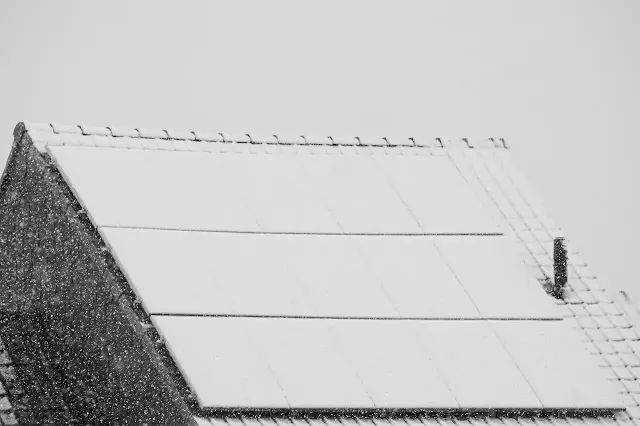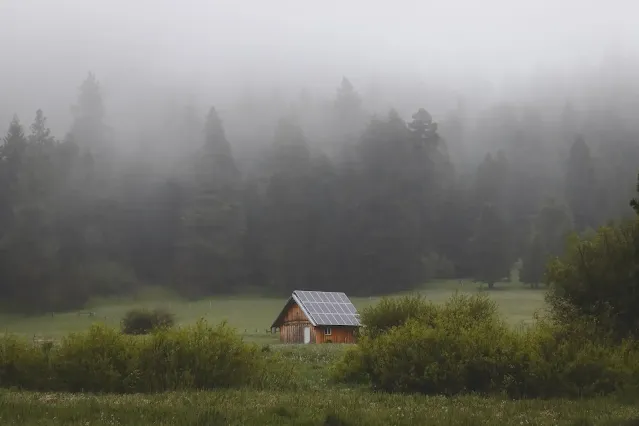Do solar panels work in winter season or snowy areas? (Full Guide)
%5B1%5D.webp)
Solar energy is the purest and cost-effective energy in the world. By using solar energy we can minimize environmental pollution and cut off our electricity bill too. Using solar energy is one of the main solutions for today’s energy crisis. Anyway, there are many wrong assumptions about using a solar panel. One of them is solar panels can not be used in the winter season. But this assumption is totally wrong.
According to many resources, Germany is the one of best energy users in the world. But throughout the year Germany gets rain, mild winter seasons the sunny days are comparatively less. also now very snowy areas like the Antarctic and Alaska also tend to use solar energy as a solution for the energy crisis.
Yes, you can use solar panels in the winter season and snowy areas. The main reason for this is we only need the sunlight to produce the energy, not the heat actually if the environment temperature is low it increases the efficiency of the solar panel. There is an interesting scientific theory behind this and we hope to cover all these facts by this article.
Why we only need sunlight to produce solar energy?
As we all know sunlight is a combination of visible light, ultraviolet, and infrared radiation. All these are electromagnetic radiations. A bundle of the energy of the electromagnetic radiation is called a photon. This is also simply called energy packets.
Also scientifically we can name it as the quantum of electromagnetic radiation. Anyway, the total energy of the sunlight is made up of these photons. As we all know solar panels are made up of silicon like semiconducting materials.
When the sunlight hits the solar panels these atoms absorb the photons. As the atoms absorb the photons it increases the energy inside the atoms. As the atoms getting the energy it tends to release their atomic electrons. These freed electrons travel throughout the solar panel. The movements of electrons produce direct current flow in the opposite direction. So as you see we only need the sunlight to generate the energy, not the heat.
Does the winter season affect the amount of sunlight we receive?
Normally if there is no heavy snow storm we can get clear sunlight even in the winter season during day time. The major drawback is the daytime is shorter these days and the time we can get the sunlight is limited because of that.
Also, there can be fallen snow collected or accumulated on your solar panels. If it is a thin snow layer it does not affect much as the snow reflects the sunlight it gives more sunlight and does not block the sunlight. But if there is a large amount of snow collected on your solar panels you may have to clean the panels.

For that, you can use a snow removing rack that is made to remove snow on the solar panels. But you have to be extra careful about your safety because as many solar panels are fixed on rooftops and some rooftops are hard to reach. Especially in the winter season, it will be harder because the snow or ice layer makes the rooftop slippery.
So first you must be careful about your safety first. Even though reaching the panel is not hard and you can clean it on your own you must be compatible to clean the panels properly.
Otherwise, any damages done when cleaning the panels will not be covered under most company warranties. So you may have to bear all the repairing costs on your own. So we recommend you avoid any cleaning on your own if you are not compatible enough and always try to get professional help for this.
Any way you can avoid the snow collecting on your solar panel by tilting up the panels at 30 to 45 degrees. Also because the solar panels are made up of dark glass it accelerates the snow melting process. Because of these two characteristics of the solar panels, it minimizes the snow collecting on the panels automatically.
How the low temperature increases the efficiency of the solar panels?
According to the resources, the solar panel increases its efficiency at low temperatures. At temperatures above 250C or 770F solar panels lost their efficiency. This incident has a scientific reason behind it. The temperature of the environment does not affect the amount of sunlight received by the solar panels. It only affects the amount of power generated by solar panels.
If two solar panels received the same amount of sunlight but one solar panel is hotter than the other then the hotter one will produce less power than the other solar panel. Let’s see the reason for this. As we mentioned earlier the direct current is produced because of the movement of the electrons throughout the solar panel.
Temperature affects the electricity flow through the circuit of the solar panel. This is done by changing the speed at which the electrons travel. With the increase of the temperature of the solar panel the resistance to the electron flow also increases. So the speed of the electrons decreases resulting in the reduction of power generation. But if the temperature is low it decreases the resistance of the circuit to the flow of electrons. So the speed of the electrons will increase causing an increase in power production.
Usually, the solar panel manufacturers mention a maximum temperature value called peak temperature. Above this peak temperature, solar panels will lose its efficiency. But in the winter season, it is hard to exceed this temperature. So it is an added advantage for you. Also in the snowy area, it is hard to exceed this temperature.
Can heavy snowstorms affect your panels?
Normally in installation, the solar panels are fixed to the solar panels very tightly. Also before fixing installation companies will make sure that your rooftop is strong enough. But if you are installing panels by your self you have to make sure the rooftop is strong and the panels are fixed properly.
If the area you are living in has frequent snowstorms it is better to go for an off-grid or hybrid system. As these solar panels come with a battery it will store the energy you need to use when there is no sunlight. Also as the hybrid system has a grid connection you can get power from the grid if the batteries also run out.
But there are many situations that many areas lost power for days due to damaged grid connections by a snowstorm. In this kind of situation, you can always get power if you have your own solar panel.
How to maintain your solar panels in the winter season.
The interesting thing is the solar panel system does not require a lot of major maintenance. The only thing you should do to keep solar power efficiency is to clean the solar panels regularly. If dust, bird droppings, or other debris accumulates on the solar panels, it will block your solar panels from getting sunlight. Then the efficiency of your solar system will drop.

If you are living in a rainy area then you don’t have to worry about cleaning solar panels regularly. Rain can remove all the dirt on your solar panels.
But if you are living in an area where has a winter season, then your regular cleaning routine is not enough. Because if snow falls on your solar panels, the efficiency of your solar system will decrease as your solar system blocks sunlight. Therefore, during the winter, when snowfall on your solar panels, you should remove snow from the solar panels.
Advantages of using solar panels in the winter season or snowy area.
- You do not have to worry about whether you have a grid connection or not, you can generate your own energy. The snowy areas like mountain ranges or less populated areas can get energy easily by using solar panels as it is hard to get grid connections in these areas.
- In the winter season, some may face financial issues due to various reasons. So as this energy is economically friendly it can help you to cut off your electricity bill.
- During the winter season, snowstorms are frequent. Grid connections can be easily damaged by these storms. So there can be power outages for days that will keep you in dark and cold. But if you have a solar panel with a battery as we said before you do not have to worry about snowstorms and power outages as you have your own energy.
| Conclusion |
There are so many wrong assumptions about solar panel usage in the snowy area or winter season. Any way using solar panels in the winter season is not as hard as you think. But it has its own advantages and disadvantages. We can summarize all the advantages and disadvantages of cold weather when using solar panels.
Advantages
- Cold temperature increases the efficiency of the solar pales as cold temperatures decrease the resistance of the circuit.
- A thin layer of snow on a solar panel reflects the sunlight and increase the amount of sunlight received by a solar panel.
- As the thin snow layers melt and slide off on its own it will remove the dust and debris from your solar panels.
Disadvantages
- As the daytime is shorter in the winter season energy production can below.
- As snowfall and collected on the panel we have to make the panel extra durable to handle the weight. So this may increase the installation cost.
- You may have to clear the snow in case of heavy snow falling.this should be done carefully as some roofs are hard to reach and can be dangerous to climb. Also if you are not compatible enough for this, the panels can get damaged and these kinds of damages will not be covered under most company warranties. So you have to bear the repairing cost by yourself.

